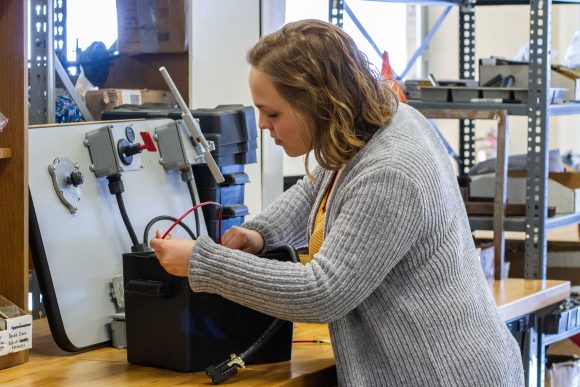Leanne Tan
Student Writer
Many of us, at one point or another, have encountered the stereotype that guys are naturally better than girls at math and science. Guys do cool stuff like science, technology, engineering and mathematics (STEM), while girls do more “feminine” things. This generalization has undoubtedly prevented many girls and women from pursuing STEM-related and other male-dominated fields. The National Girls Collaborative Project (NGCP) reveals that women constitute only 28 percent of the science and engineering workforce in the U.S.
Despite the gender imbalance in various STEM fields, a considerable number of girls and women everywhere (including our very own Messiah College!) are defying odds to chase after their dreams in male-dominated fields.
One of them is sophomore computer and information science major Belosan Jekale. She chose her major because of the positive experience she had in her high school programming class. Her decision was also influenced by her relative who is a software engineer.
Jekale’s decision did not surprise most people that know her, but it did for others. “When I meet people for the first time, they wouldn’t expect me [to major in computer science] so it’d come as a surprise to them,” Jekale said.
The same can be said of sophomore Faith Kerlen, an engineering major with a mechanical concentration. According to the Harvard Business Review, engineering is the most male-dominated STEM field in the U.S., with women making up approximately 13 percent of the engineering workforce.
“There’s this kind of aura associated with engineering that I don’t fully understand,” Kerlen said. “Most people were pretty encouraging [of my pursuit of engineering]; some thought it was a little weird or abnormal but the people who were closest to me know that I’m a little bit of a nerd.”
As a minority in her major, Kerlen finds it intimidating at times. However, she has also found much enjoyment as she does not have to worry too much about competition.
One challenge Kerlen faces as a female student in her field of study is not having prior experiences that many of her male counterparts had.
“A lot of guys have grown up working on their cars or their dads would teach them stuff in the shop,” Kerlen said. “I came in with none of that background … so when it comes to stuff like that, I do feel kind of inferior or inadequate just because I never had that opportunity, but it’s never affected me a ton.”
Similarly to Kerlen, senior civil engineering major Kimberly Cunningham felt inferior during her internship as a construction materials testing inspector a few summers ago.
“I went out to different job sites and tested the concrete and soil compaction,” Cunningham said. “When the foremen saw me, I knew what they were thinking, ‘wow, this is different,’ so I felt I had to prove myself quickly to change the judgment.”
The NGCP said that currently, less than five percent of racially underrepresented women in STEM are employed scientists and engineers. With the constant push for diversity, many companies are especially interested in hiring minority groups, be it racial or gendered.
“When I go to career fairs, I stand out,” Cunningham said. “Since employers are trying to push for diversity at the workplace, they’ll be interested and want to talk to me more. Which is okay but I don’t want [my gender and race] be the only reasons they hire me.”
Cunningham believes that women are capable of excelling in STEM-related fields, but aren’t always encouraged to consider them.
“Biologically, women are geared toward nurturing,” Cunningham said. “But I think if they were told they could nurture and also use their intellectual abilities to do engineering, then they would, too.”
Jekale and Kerlen both share similar sentiments as Cunningham.
“At the end of the day we all have brains and they’re sort of wired the same way,” Jekale said. “Sure, there might be things that more people are interested in, but both females and males are capable of doing the same things at the same capacity.”
The NGCP shows that female and male students in K-12 do not differ in their math and science abilities. This leaves Kerlin wondering why males would be encouraged more heavily towards STEM fields.
“Coming from my outlook of the world, it’s hard to understand why STEM fields are male dominated because there shouldn’t be any reason why any field should be male-dominated,” Kerlen said. “I think it’s important to encourage girls to pursue what they’re interested in and I think it’s interesting to see the ratio is starting to change a little bit.”
Jekale advises female students pursuing male-dominated fields to persevere and not give up.
“We’re all in this together and one day our efforts will pay off,” Jekale said. “Encourage other females as well because there might be some out there who think ‘oh, I can’t do this,’ because of the stigma that’s put on them. But anyone can; anyone can do this.”



